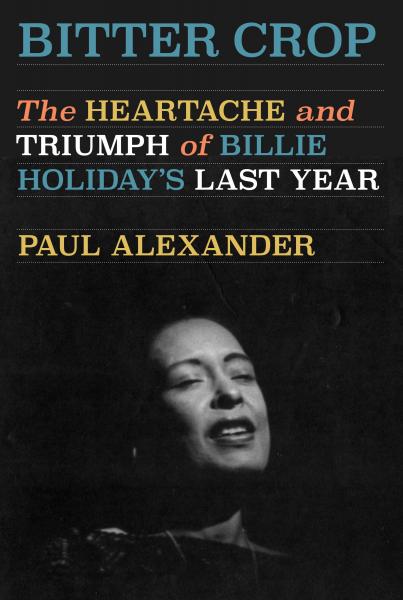SEARCH
SEARCH
|
For general questions about reservations or event details, please contact the DC Public Library location you are planning to visit. For those in need of disability services related to event registration or room reservation, please reach out to the Center for Accessibility at 202-727-2142 or DCPLaccess@dc.gov. |
In celebration of this year's Black History Month theme: the arts, the Martin Luther King Jr. Memorial Library is excited to host Paul Alexander to celebrate the life and legacy of Billie Holiday.
Biographer, Paul Alexander will discuss his book Bitter Crop:The Heartache and Triumph of Billie Holiday’s Last Year with a moderator, answer questions from the audience, and sign copies of the book. Register for your seat and learn more about the author and book below.
This program is sponsored by the DC Public Library Foundation and the Anacostia Community Museum. Select copies of Bitter Crop:The Heartache and Triumph of Billie Holiday’s Last Year will be gifted to attendees while supplies last.


A revelatory look at the tumultuous life of a jazz legend and American cultural icon
In the first biography of Billie Holiday in more than two decades, Paul Alexander—author of heralded lives of Sylvia Plath and J. D. Salinger—gives us an unconventional portrait of arguably America’s most eminent jazz singer. He shrewdly focuses on the last year of her life—with relevant flashbacks to provide context—to evoke and examine the persistent magnificence of Holiday’s artistry when it was supposed to have declined, in the wake of her drug abuse, relationships with violent men, and run-ins with the law.
During her lifetime and after her death, Billie Holiday was often depicted as a down-on-her-luck junkie severely lacking in self-esteem. Relying on interviews with people who knew her, and new material unearthed in private collections and institutional archives, Bitter Crop—a reference to the last two words of Strange Fruit, her moving song about lynching—limns Holiday as a powerful, ambitious woman who overcame her flaws to triumph as a vital figure of American popular music.
A talented biographer paints a memorable portrait of an American master.
 Paul Alexander has published eight books, among them Rough Magic, a biography of Sylvia Plath, and Salinger, a biography of J. D. Salinger that was the basis of a documentary that appeared on American Masters on PBS, Netflix, and HBO. His nonfiction has appeared in numerous publications, including The New York Times, Los Angeles Times, The Boston Globe, Newsday, New York, The Guardian, The Nation, The Washington Post, and Rolling Stone. He teaches at Hunter College in New York.
Paul Alexander has published eight books, among them Rough Magic, a biography of Sylvia Plath, and Salinger, a biography of J. D. Salinger that was the basis of a documentary that appeared on American Masters on PBS, Netflix, and HBO. His nonfiction has appeared in numerous publications, including The New York Times, Los Angeles Times, The Boston Globe, Newsday, New York, The Guardian, The Nation, The Washington Post, and Rolling Stone. He teaches at Hunter College in New York.
Alexander, the author of biographies of J.D. Salinger, Sylvia Plath, and John McCain, revisits the story of the brilliant jazz singer Billie Holiday (1915-1959), concentrating on the final year of her life, which almost perfectly encapsulated the spirit of her turbulent success, ambition, and significant struggles with romantic relationships, alcohol, and drugs. Readers familiar with jazz will instantly recognize the title’s reference to Holiday’s most recognizable song, “Strange Fruit,” the poignant anti-lynching anthem that met with mixed reviews from white audiences and warnings from the federal government against its performance. Alexander’s evocative prose seamlessly complements the painstaking research that he conducted via interviews with contemporaries of Holiday, his thorough archival mining, and his use of never-before-seen material from private collections to distinguish the fact, fiction, and embellishment about Holiday’s life that has been disseminated by music critics, early biographers, and Holiday herself. Though Alexander demonstrates an impressive knowledge of jazz, this book is not exclusively for music aficionados. He tells Holiday’s story while delivering a cogent social history of America in the first half of the 20th century. The author incorporates published reviews of Holiday’s performances, interviews she gave, and wonderfully composed vignettes of TV, radio, and recording performances, particularly the session that produced what Holiday considered her finest album and life metaphor, Lady in Satin (1958). That album “would come to represent a final capstone in a life that was defined by personal heartbreak eclipsed by a level of artistic achievement rarely witnessed in the world of popular music.” Alexander demonstrates why—despite the disappointments, broken dreams and relationships, and personal failings—Holiday believed her life to be a triumph. He has written a tale as unique as Holiday’s voice and, more importantly, given voice to the life of an American original.
AGE GROUP: | Adults |
EVENT TYPE: | Black History Month | Author Talk |
